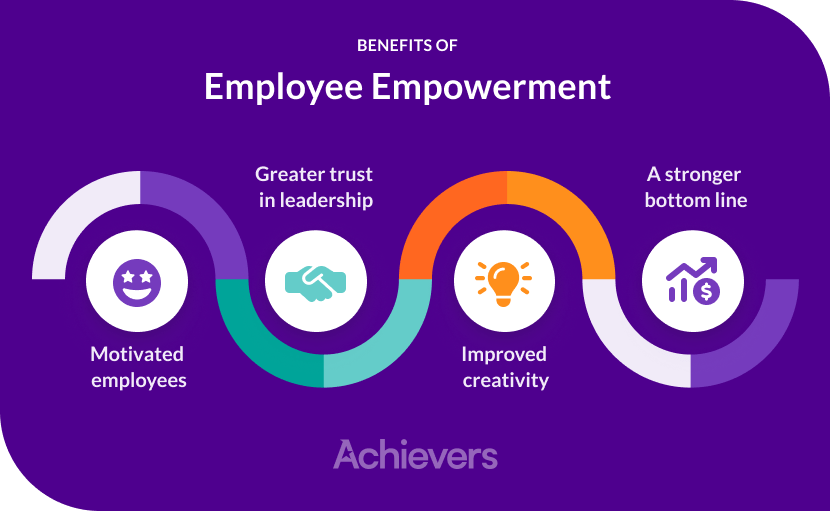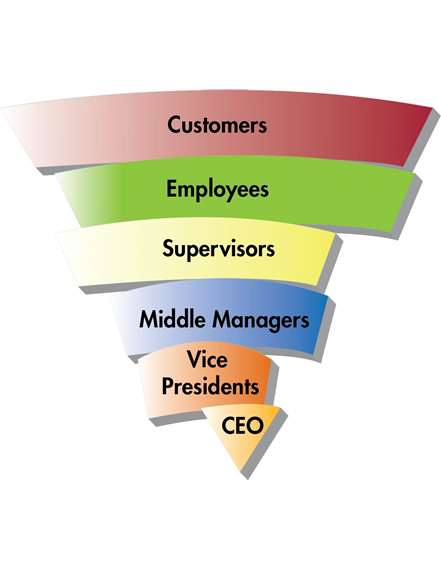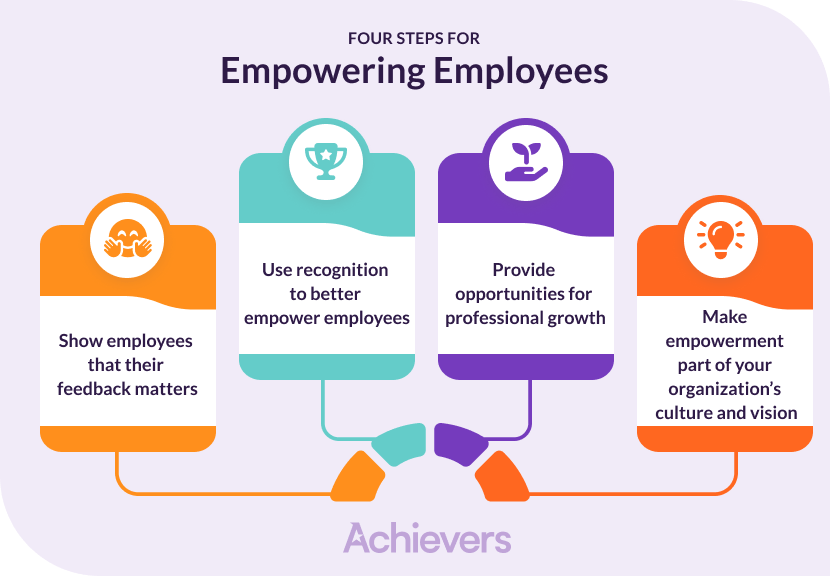What Is Employee Empowerment?
Employee empowerment is the process of giving employees authority and responsibility to make decisions and take action to improve their work environment and contribute to the organization’s success. This fosters a sense of ownership, increases job satisfaction, and enhances productivity and innovation within the workforce.
In today’s dynamic work environment, organizations are recognizing the importance of employee empowerment. It involves creating a culture that values and respects employees’ opinions, skills, and expertise, allowing them to have control over their work and providing the necessary resources and support to succeed.
By empowering employees, organizations tap into their potential and unleash their creativity, driving them to take initiative, solve problems efficiently, and adapt to change readily. This results in a more engaged and motivated workforce, leading to improved performance and overall organizational success. Empowerment also leads to higher job satisfaction, retention, and loyalty among employees, making it a crucial aspect of modern management.
Benefits Of Employee Empowerment
Employee empowerment refers to providing employees with the necessary tools, resources, and authority to make decisions and take ownership of their work. This approach promotes a healthy, collaborative work environment and has numerous benefits for both employees and the organization as a whole.
Increases Employee Motivation
Empowering employees can significantly boost their motivation levels. When employees are given the freedom to make decisions and take initiative, they feel a sense of pride and ownership in their work. This feeling of autonomy motivates employees to go above and beyond, as they have a vested interest in the outcomes of their efforts.
Moreover, empowered employees tend to have a clearer understanding of their roles and responsibilities. They have a sense of purpose and direction, which drives them to perform to the best of their abilities. This increased motivation translates into higher productivity levels and improved job performance.
Enhances Job Satisfaction
Employee empowerment plays a crucial role in enhancing job satisfaction. When employees feel valued and trusted, they are more likely to be satisfied with their jobs. Empowerment fosters a positive work environment where employees feel appreciated and acknowledged for their contributions.
Additionally, empowered employees are often given opportunities for skill development and growth. They are encouraged to take on new challenges and responsibilities, which helps them build their skills and expertise. This continuous learning and growth not only contributes to job satisfaction but also increases employee loyalty and retention.
Moreover, when employees have a say in decision-making and problem-solving processes, they feel a sense of control. This control over their work increases job satisfaction as it gives them a sense of fulfillment and accomplishment.</p

Credit: www.achievers.com
Characteristics Of Empowered Employees
Empowered employees are those who are given the autonomy and authority to make decisions and take ownership of their work. These individuals are not only highly motivated but also display a unique set of characteristics that contribute to their effectiveness and success within an organization.
Takes Initiative
One of the key characteristics of empowered employees is their ability to take initiative. These individuals proactively seek opportunities to improve processes, suggest innovative ideas, and take on additional responsibilities without waiting to be told what to do. They demonstrate a strong sense of ownership and accountability, which drives them to go the extra mile in their work.
Empowered employees are self-starters who take charge of their own personal and professional growth. They don’t wait for instructions or rely solely on their supervisors to guide them. Instead, they look for ways to contribute meaningfully to the organization and take action without hesitation. This proactive mindset allows empowered employees to seize opportunities and make a positive impact on the company’s success.
Problem-solving Skills
Another characteristic of empowered employees is their exceptional problem-solving skills. These individuals have the ability to analyze complex situations, identify challenges, and propose viable solutions. They are not afraid to take risks and are confident in their abilities to overcome obstacles.
Empowered employees view challenges as opportunities for growth and development. They approach problems creatively and think outside the box to find innovative solutions. Their problem-solving skills enable them to adapt to changing circumstances, resolve conflicts, and drive positive change within their teams and the organization as a whole.
Moreover, empowered employees are not only adept at solving problems individually but also excel at collaborating with others to find the best possible solutions. They actively seek input from colleagues, leverage their diverse perspectives, and work together to tackle complex issues. This collaborative problem-solving approach fosters a culture of teamwork and encourages continuous improvement.
| Characteristics of Empowered Employees |
|---|
| Takes Initiative |
| Problem-Solving Skills |
Ways To Empower Employees
Employee empowerment refers to the process of giving employees the authority, resources, and responsibility to make decisions and take action in their work. It is a management strategy that aims to enhance employee morale, productivity, and satisfaction by providing them with the tools and support they need to thrive in their roles.
Clear Communication Channels
Establishing clear communication channels is crucial for empowering employees. By providing open lines of communication, employees feel valued and heard, which improves morale and engagement. Managers should create a culture of transparency, where feedback and ideas are welcomed and encouraged.
Providing Training Opportunities
Offering training opportunities is another effective way to empower employees. By investing in their professional development, organizations demonstrate their commitment to the growth and success of their employees. This can be done through workshops, seminars, online courses, or mentorship programs.

Credit: asq.org
Challenges In Implementing Employee Empowerment
Implementing employee empowerment can be a transformative process for any organization. It can drive innovation, boost productivity, and improve employee satisfaction. However, like any major organizational change, there are challenges that need to be addressed for a successful implementation. Understanding and overcoming these challenges is crucial to ensure the smooth adoption of employee empowerment strategies. In this article, we will explore two key challenges that organizations commonly face when implementing employee empowerment: resistance to change and lack of trust.
Resistance To Change
Resistance to change is a natural response that arises when employees are introduced to new ways of working. It can stem from fear of the unknown, concerns about job security, or a reluctance to deviate from established routines. Overcoming resistance to change requires effective communication and engagement with employees at all levels of the organization.
To mitigate resistance, organizations need to clearly communicate the reasons behind the implementation of employee empowerment. Transparency and open dialogue can help employees understand the benefits and dispel any misconceptions or fears they may have. Providing training and support to employees during the transition period can also help alleviate concerns and build confidence in the new approach.
Some strategies to overcome resistance to change include:
- Creating a shared vision: Clearly articulate the goals and objectives driving the implementation of employee empowerment.
- Empowering employees to be part of the process: Involve employees in decision-making and encourage their feedback to foster a sense of ownership.
- Providing continuous support: Offer training, coaching, and mentorship programs to help employees adapt to new roles and responsibilities.
- Celebrating successes: Recognize and reward employees for their contributions to the successful implementation of employee empowerment.
Lack Of Trust
Trust is the cornerstone of any successful employee empowerment initiative. Without trust between employees and management, the empowerment process can quickly falter. Building trust requires open and honest communication, transparency, and consistent actions that align with the values and principles of empowerment.
Organizations should prioritize building trust by fostering a culture of collaboration and respect. Empowering employees means giving them the autonomy and authority to make decisions, which can only happen when there is trust in their capabilities and intentions.
Here are some ways to address and overcome a lack of trust:
- Promote open communication: Encourage employees to express their ideas, concerns, and feedback openly. Actively listen and respond with empathy and understanding.
- Lead by example: Managers and leaders should model the behavior they want to see in their teams. When employees see leaders actively practicing transparency and trust, it becomes easier for them to follow suit.
- Provide clear guidelines: Clearly define the extent of employees’ decision-making authority and set expectations for accountability and responsibility.
- Recognize and reward trust-building behaviors: Acknowledge and appreciate individuals or teams that demonstrate trust-building behaviors, such as collaboration, sharing knowledge, and taking ownership of tasks.
Successful Examples Of Employee Empowerment
Employee empowerment is a key aspect of fostering a positive work culture, encouraging creativity, and driving innovation within organizations. By giving employees the authority and autonomy to make decisions, take risks, and contribute to the growth of the company, organizations can reap the benefits of increased employee satisfaction, productivity, and ultimately, business success. Let’s explore two successful examples of companies that have embraced employee empowerment as a core value.
Google’s ‘20% Time’ Policy
In an industry known for its forward-thinking and innovative practices, Google has stood out with its unique ‘20% Time’ policy. This policy encourages employees to spend 20% of their work time on projects outside their core responsibilities. It serves as an incubator for creativity and allows employees to explore their passions and bring new ideas to the table. This approach has led to revolutionary projects such as Gmail, AdSense, and Google News, all of which have contributed significantly to Google’s success.
This commitment to employee empowerment not only fuels creativity but also fosters a sense of ownership and personal investment in the company’s success. It enables employees to take control of their own professional development and encourages them to think outside the box, leading to breakthrough innovations.
Zappos’ Culture Of Empowerment
Zappos, the renowned online shoe and clothing retailer, is another prime example of a company that embraces employee empowerment. Zappos believes that employees who are empowered to make decisions can provide exceptional customer service and contribute to the company’s growth. To achieve this, Zappos has created a unique culture where employees are trusted and encouraged to take the initiative.
- This empowerment is exemplified in Zappos’ customer service approach, where representatives are not only allowed but also encouraged to go above and beyond to satisfy customers.
- Moreover, Zappos’ commitment to employee empowerment is reflected in its policy of offering new employees $4,000 to leave the company if they don’t feel aligned with its core values and culture within the first few weeks of onboarding.
- This bold move not only helps Zappos attract passionate individuals but also ensures that only those who truly believe in the company’s vision and are willing to take responsibility for their actions remain.
Zappos’ culture of empowerment has resulted in remarkable success in both customer satisfaction and employee morale. By entrusting their workforce and equipping them with the tools and support they need, Zappos has built a company that consistently goes the extra mile to build meaningful relationships and create exceptional experiences for its customers.

Credit: www.aihr.com
Frequently Asked Questions For What Is Employee Empowerment?
What Is Employee Empowerment And Why Is It Important?
Employee empowerment is the process of giving employees the authority and autonomy to make decisions. It is important because it increases job satisfaction, productivity, and creativity.
How Can Organizations Effectively Empower Their Employees?
Organizations can effectively empower their employees by providing clear goals, open communication channels, ongoing training, and recognition of achievements.
What Are The Benefits Of Employee Empowerment For Businesses?
Employee empowerment benefits businesses by improving employee retention, boosting innovation and problem-solving capabilities, and enhancing customer satisfaction.
Conclusion
Employee empowerment is a powerful tool for organizations to cultivate a culture of trust, engagement, and excellence. By granting employees the autonomy to make decisions, providing them with the necessary resources and support, and fostering a collaborative environment, companies can experience numerous benefits such as increased productivity, innovation, and employee satisfaction.
Embracing employee empowerment is not only a strategic move, but a commitment towards creating a positive and fulfilling work environment for everyone involved.


